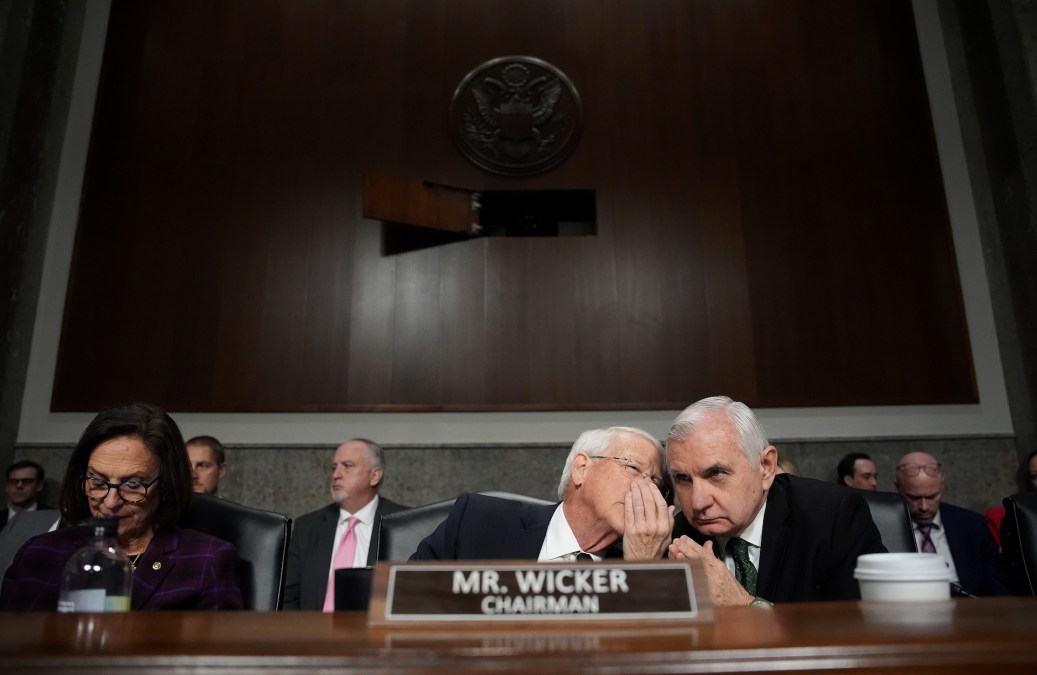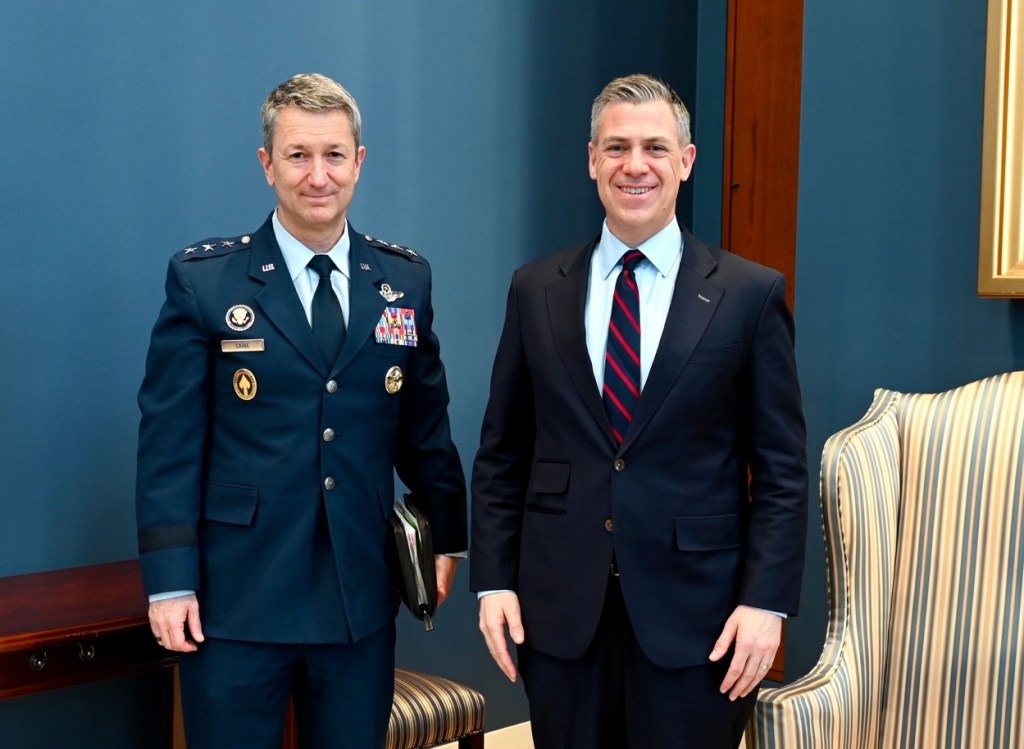5 hot topics Dan ‘Razin’ Caine might address during his confirmation hearing Tuesday

One of the most highly anticipated confirmation hearings in recent memory is scheduled for Tuesday, when retired Lt. Gen. Dan “Razin” Caine — President Donald Trump’s nominee to be the next chairman of the Joint Chiefs of Staff — will testify before the Senate Armed Services Committee.
Caine is more of a mystery than some previous nominees for the post who held more high-profile positions prior to being picked for the job. He recently retired from the Air Force as a three-star and he’s never served as a combatant commander, service chief or vice chief, although he held a variety of roles during his long military career.
Trump surprised many in February when he announced Caine as his choice for chairman after firing Gen. Charles “CQ” Brown, who had been elevated to that position by President Joe Biden.
The commander-in-chief officially submitted Caine’s nomination to the Senate March 10, and the nominee has been meeting privately with lawmakers in the run-up to Tuesday’s hearing.
Caine’s oral and written testimony will offer the public and members of the national security community more insights into his thinking on a variety of defense issues.
Here are a few of the hot topics that may come up when the nominee goes under the spotlight:
SignalGate
There is bipartisan concern among lawmakers about a recent incident that came to light when it was revealed by the Atlantic magazine’s editor-in-chief Jeffrey Goldberg that he was included in a message chain on Signal — an encrypted but unclassified messaging app — where some of the president’s closest advisers discussed forthcoming strikes targeting Houthi militants in Yemen. The group included Defense Secretary Pete Hegseth, Vice President JD Vance, Secretary of State Marco Rubio, CIA Director John Ratcliffe, Director of National Intelligence Tulsi Gabbard, national security adviser Michael Waltz and other officials.
Some have dubbed the controversy “SignalGate”.
Senate Armed Services Committee Chairman Roger Wicker, R-Miss., and Ranking Member Jack Reed, D-R.I., sent a letter last week to the Pentagon’s acting inspector general requesting a probe of the incident and raising questions about the use of unclassified networks to discuss sensitive and classified information and sharing such info with people who don’t have proper security clearance.
Although Caine wasn’t involved in the controversial Signal chat, he may be asked his opinions on the use of certain information technologies by DOD officials for communications and related security issues.
Current and former defense officials told DefenseScoop last week that SignalGate underscores a need for secured chat options for government and military insiders.
AI and autonomous weapons
Caine will have a forum at the hearing to air his views on the Defense Department’s modernization initiatives, which are wide-ranging and include new weapons platforms as well as software, networking tools and other enablers.
Of particular interest to some will be his perspective on using artificial intelligence and highly autonomous systems for military applications.
Pentagon leaders are keen on developing and deploying AI capabilities for back-office functions and battlefield operations. However, there have been longstanding concerns about the risks involved with allowing military platforms — particularly lethal ones — to have a large degree of autonomy.
The Defense Department defines an autonomous weapon system as “a weapon system that, once activated, can select and engage targets without further intervention by an operator. This includes, but is not limited to, operator-supervised autonomous weapon systems that are designed to allow operators to override operation of the weapon system, but can select and engage targets without further operator input after activation.”
Meanwhile, the military is also exploring generative AI technology, including large language models.
For example, the Defense Information Systems Agency is launching an experimental cloud-based chatbot for U.S. Indo-Pacific Command that will allow users to test the tool on classified networks.
However, there are concerns in the national security community and elsewhere about the potential downsides of genAI, including the risk of “hallucinations” where models produce inaccurate, misleading or biased results that could create problems for the humans who are trying to leverage them.
Caine may offer his views on the best use cases for AI and any guardrails that he feels are important to mitigate risks.
DOGE
The Pentagon, like other federal agencies, is pursuing controversial Department of Government Efficiency (DOGE) efforts, which include cuts to programs and the workforce.
Pentagon leadership is aiming to reduce DOD’s civilian workforce by 5-8 percent — or upwards of 50,000 employees — via multiple pathways.
On March 28, Hegseth signed a new memo about “Initiating the Workforce Acceleration and Recapitalization Initiative.” The SecDef is reopening the deferred resignation program and also offering early retirement to eligible civilian workers as he seeks to “maximize participation.”
Hegseth has also instituted a civilian hiring freeze — while allowing for some exemptions — and the department intends to fire certain probationary workers.
The Pentagon chief has said he wants to reinvest the savings from these efforts into high-priority warfighting capabilities.
Caine will likely be asked for his views on DOGE and other personnel issues, which could include how he thinks any savings should be reinvested and which parts of the workforce should be protected from cuts.
Combatant command reorg
The U.S. military has seven geographic combatant command: Indo-Pacific Command, European Command, Central Command, Africa Command, Northern Command, Southern Command and Space Command.
The other CoComs include Cyber Command, Special Operations Command, Strategic Command and Transportation Command.
Multiple media outlets have reported that Pentagon officials are considering consolidating some of the combatant commands, including folding together U.S. European Command and U.S. Africa Command as well as Southern Command and Northern Command — among other organizational changes — as a cost-cutting measure.
Wicker and others have expressed concerns about such reports. It would be surprising if members of the Senate Armed Services Committee didn’t ask Caine for his views on how such a reorganization of the CoComs and other components would impact readiness and U.S. military capabilities.
America’s role on the world stage
As chairman of the Joint Chiefs of Staff, one of Caine’s most important tasks would be to provide the president advice on international conflicts and tensions.
At Tuesday’s hearing, he’ll have an opportunity to offer his thoughts on various geopolitical hotspots — from the war in Ukraine to tensions with China in the Pacific.
Caine’s confirmation process is taking place as the Pentagon is trying to prepare for a potential fight with the People’s Liberation Army, a highly advanced adversary. Some U.S. officials are concerned that Chinese forces may try to invade Taiwan sometime in the next few years. In such a scenario, the United States could be draw into a major war in the region.
However, the American military is also being tasked to conduct operations in the Middle East against groups like the Houthis and ISIS. Meanwhile, tensions are running high with Iran after Trump recently threatened to bomb the country if it doesn’t reach a deal regarding its nuclear program.
The Trump administration is also pushing Europeans to take on more of the leadership burden in NATO as Washington seeks to focus more on the Indo-Pacific and the homeland. At the same time, it’s pressuring Ukraine to reach a peace agreement with Russia, but some lawmakers, including Wicker, are wary of Moscow’s intentions.
Meanwhile, Trump has expressed interest in annexing Greenland and asserting American control over the Panama Canal. And closer to home, U.S. troops have been deployed to the border with Mexico to bolster security and the administration has designated drug cartels as foreign terrorist organizations.

Historically, as uniformed military officers, members of the Joint Chiefs of Staff have been expected to be apolitical and nonpartisan. Nevertheless, Caine may face questions from lawmakers trying to gauge his level of support for the MAGA and America First movements.
Reed, the top Democrat on the Senate Armed Services Committee, previewed a potential line of questioning during an appearance on ABC News’ “This Week” in February.
“There are obviously a great many questions that we’re going to raise with him, but I think we have to give him the opportunity to make his case and also to make clear that he is going to be willing to speak truth to power, willing to give his best military advice to the president, not just tell the president what he wants to hear — and also to be open and share with the Congress the facts on the ground, not be a political spokesperson for the president. So those are part of the issues that we’ll address as we go forward,” Reed said.
Barring a disastrous permanence at the hearing, Caine is expected to garner enough votes to get confirmed. Republicans have a majority in the Senate with 53 GOP members. Apart from Hegseth, who narrowly won confirmation in January, Trump’s nominees for top Pentagon posts during his second term have been confirmed by comfortable margins during final voting, including his picks for deputy secretary of defense, secretary of the Army and secretary of the Navy.






